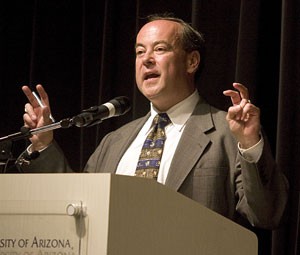In front of more than 300 members of the Tucson community yesterday, Clint Bolick leaned in to his microphone and told the partisan crowd what most of them did not want to hear.
“”I’m going to focus my comments on the practical side of what has come to be known as affirmative action,”” he said. “”But what I refer to as preferential treatment.””
Bolick, director of the Goldwater Institute, the chief supporter of the Arizona Civil Rights Initiative, debated Dennis Shields, dean of the Phoenix School of Law, on what is the best way to decrease institutional racism in Arizona.
Diversity in educational institutions is the backbone of what has led universities around the nation to thrive both academically and economically, Shields said.
“”Diversity doesn’t happen by accident,”” he said. “”There are a lot of problems caused by race.””
The problems associated with race and education date back to minority students’ initial encounter of public education as they make their way from kindergarten to high school.
Such experiences in underfunded schools leave minorities at a disadvantage. Affirmative action and programs aimed toward providing aid to minority groups are simply giving students a fair chance at education by reversing this disadvantage, Shields said.
“”If society could have solved the diversity problem earlier, we wouldn’t be arguing about it now,”” he said.
Shields regarded the initiative as a fictitious end-all solution that oversimplifies problems raised by race. The reality is complex and requires more than a single piece of legislature, he said.
“”This is a hard problem,”” he said. “”You don’t solve it by waving a wand.””
Although the state measure has been called “”institutionalized racism”” by Associated Students of the University of Arizona Sen. Dustin Cox, Bolick argued the initiative is the exact opposite.
Minority-targeted scholarships and programs are forms of statewide racism, while the measure champions the fight for equal rights, Bolick said.
“”Even though we don’t have legal segregation, there are other things dividing us,”” he said. “”Identities should not be dictated by ethnicity.””
Rather than helping students based solely on skin color and ethnicity, schools should provide aid based on underprivileged status and financial burden, Bolick said.
“”People are individuals. Now we have the opportunity to treat them as such,”” he said. “”I say we go for it.””
During the question and answer session following the regular portion of the debate, Bolick was asked why he, a resident of Arizona for less than a decade, should be in a position to decide what is best for those who have lived in the state for a longer period.
Bolick and his family have lived in Arizona for seven years, “”long enough to maybe be considered a native,”” he said.
The crowd jeered at the response in disagreement.
No matter the position taken by students, the debate was a success. Students became more informed on the issues at hand directly from the source, an important step in creating a racial dialogue among UA students, said ASUA Sen. Ezekiel Gebrekidane.
“”People are becoming aware what the issue is about,”” he said. “”I think people will come to the ultimate goal of choosing the right choice for the state of Arizona.””
Although Bolick made some convincing arguments, they did not reflect the nature of the 20th century civil rights movement, an effort made possible by minority unity, said Andre Rubio, ASUA diversity director.
“”We’ve heard all these arguments before,”” he said. “”Part of being a democracy is we protect minority interests.””
Because race and ethnicity were the focus of the debate, the participants gave very little lip service to the ways the initiative would affect women on campus.
Programs like the Women’s Resource Center may be eradicated or forced to find a different source of funding, Rubio said.
After watching Bolick and Shields in action, it is clear both sides are fighting for racial equality. They just have different views on how best to achieve that goal, Rubio said.
The students’ fight against the initiative will not end with the school year. Officials from ASUA and the Arizona Students’ Association will be hard at work over the summer organizing various hearings and town hall discussions, he said.
“”What has been done to minorities can never really be corrected,”” Rubio said. “”It was important for people to see the debate, but there’s still a lot of work to be done.””









